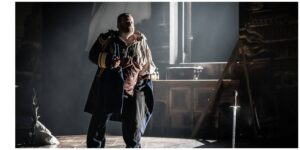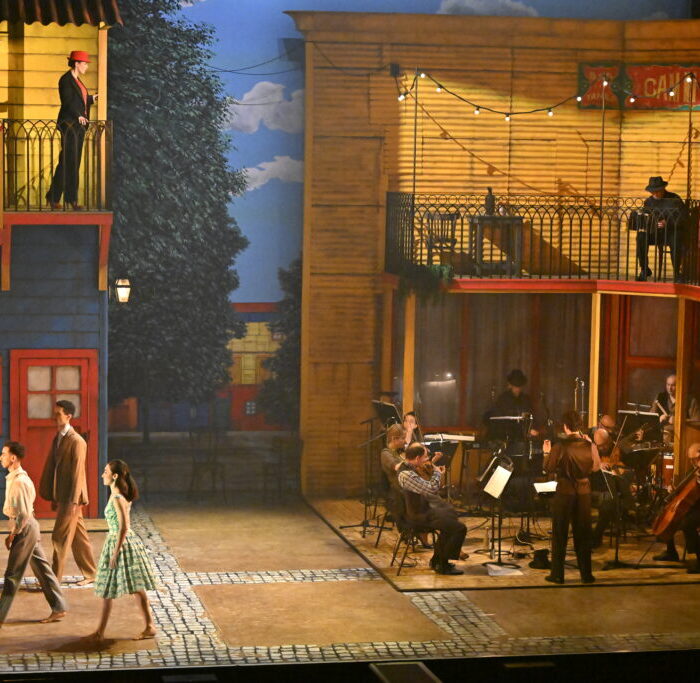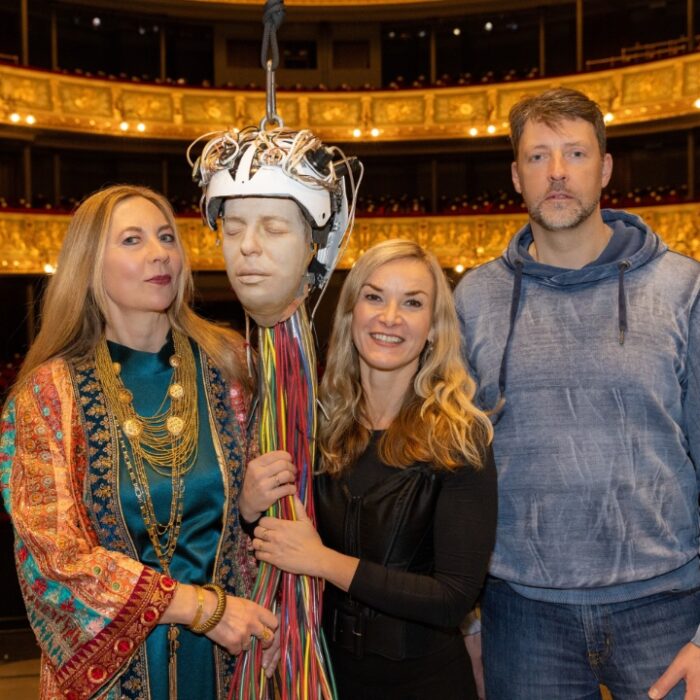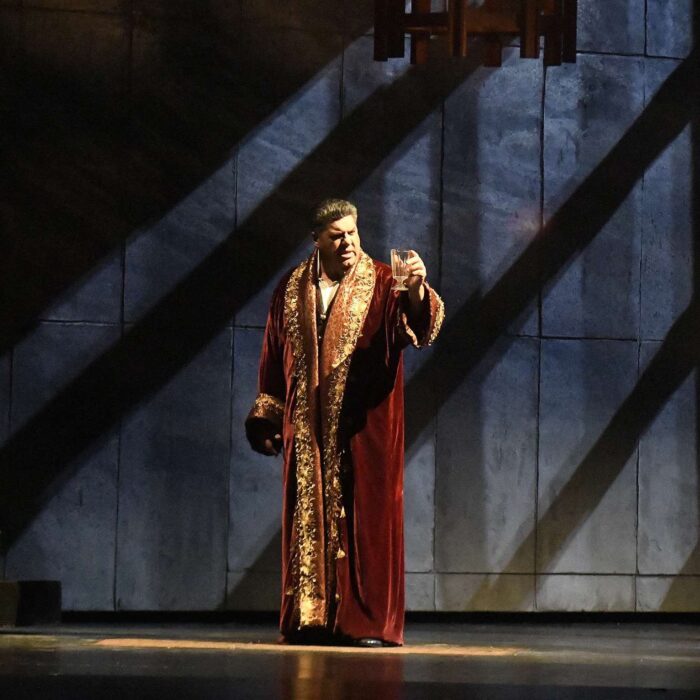
Grange Park Opera 2023 Review: Tristan und Isolde
Peerless Singing Dominates in Charles Edwards’ Smart Production
By Benjamin Poore(Photo: Marc Brenner)
“Tristan und Isolde” isn’t an opera generally known for its laughs. Indeed, sniggers from the audience generally indicates that something has gone drastically wrong in the direction department with this particular work.
But in the this new production from Grange Park Opera, just outside of London, a sprinkling of giggles and smiles are testament to the zippy performance of soprano Rachel Nicholls, who infuses the title character with a vivacity and élan that finds its ultimate resolution in an assertive and striking denouement.
Resetting & Deconstructing Wagner
Director and designer Charles Edwards hones in on Wagner’s medievalism, setting the action in a pre-Raphaelite-inflected late nineteenth century. It’s a strong enough idea for an opera that takes on bourgeois morality; the Arts and Crafts movement saw in the raw physicality of art a redemptive alternative to alienated social mores, and access to a realness that the title pair of Wagner’s opera strive towards, located in sexuality. The designs are based on Wagner’s own vision for the piece, but the evocative lighting (Tim Mitchell) is more like Wagner’s great successor in stage design Adolphe Appia in its ability to shape and focus psychological ramifications.
In Edwards’ staging suffocation and hedonism feed off each other through costumes and furniture that are plush, stuffy, and bourgeois; the iconography of pre-Raphaelite art offers a kind of fetishistic, sensual draw. Isolde knows she is in a story, trying out all the poses she’s seen in paintings as she awaits Tristan at the top of Act two, and expressing her impatience with Wagner’s delayed musical gratification at the same time.
When they finally enter the love-duet, Tristan goes to the harp stage left as she swoons. There is a strong sense of the way artworks structure desire, and that our intoxication by the latter is shaped by the former, though Edwards doesn’t break into fully deconstructive mode till right at the end. Elsewhere the iconography suggests the confinement of the hysteric – Isolde writhing in her iron bed frame in Act one, as if confined due to a spurious nervous disorder. Her hyperactive, sardonic performance – even snarling at times – is part of this thread too, and rattles the cage of the opera.
The light extinguished in Act two is a big ornate candelabra; King Mark is a top-hatted gent straight out of a Renoir painting, stiff and proper in comparison to Gwyn Hughes Jones’ increasingly bohemian Tristan. Kurwenal and his colleagues are drunk, mostly; by Act three, back in Brittany, the room is bare and bleak, with the candelabra fallen, and a step-ladder by the window suggesting the psychological waste of Beckett’s “Endgame”. Tristan’s death is the willing embrace of oblivion – he finally goes into through the doors, stage right, that periodically burst open to bathe them in a terrible golden light. Kurwenal, try as he might, cannot follow, and dies in the purgatorial ruins.
This existential drift goes in another direction in the very final peroration of the “Liebestod.” Isolde starts to undo her neck-high green dress to step out of it into jeans, a plain white top, and modern shoes. It is an old kind of womanhood that has died, as she, through the embrace of a very modern sexuality, invents a new kind, and wanders upstages into blazing white light and billows of dry ice. It is startling and engaging, which works both for it and against it, given how incrementally the music and ideas of the opera grow.
There are strangely cartoonish elements that add little, or confound the stage picture – Merlot’s shotgun might be period appropriate – even tellingly priapic – but the clunky sound effect is absurd in these high-tension moments; Kurwenal’s oddly comic falls would be right in Buster Keaton but sit oddly here. The final transfiguration of Isolde is a strong reading of the character on paper, but needs some kind of preparation in the opera so that it unfolds as organically and inevitably as the score, rather than bringing unbidden alienation.
Sensational Singing
Incongruities in production are mostly brushed aside by some absolutely sensational singing. A smaller theater means neither Rachel Nicholls nor Gwyn Hughes Jones have to push, and diction and vocal nuance from both were remarkably engaging and uniquely vivid. Nicholls shines in this role, as she did in the more cavernous London Coliseum for Richard Jones’ “The Valkyrie” at ENO in 2021.
Nicholls’ technical security is remarkable across the long-haul flights of Acts one and two, always singing right in the middle of the note, and with steely strength above the stave with top notes that are never snatched but bloom. But added to this is a precise feeling for the characterization of lines, with a host of color and weights applied to give the lengthy sequences of narration – particularly in Act one – the immediacy of a stage play. In the “Liebstod” Nicholls’ was unfazed by an extremely steady tempo, with an endless reservoir of breath and unerring sense of line proving totally transporting.
Gwyn Hughes Jones makes a similar impact. He is untiring – no faltering at the final hurdle of Act three – in both definition, intonation, and requisite power. As a tenor who has plenty of experience in the meaty roles of Puccini and Verdi there is a strong underlying legato that means Act two unfolded with sensuality and ardor. But it is Act three that astonishes. The first song monologue was sung prone, into the pillow, piano throughout but with the definition of a Shakespearian soliloquy. You could hear the sound of the fabric against his face, and it is one of the most startlingly intimate things I have ever heard in Wagner singing. Elsewhere, when recalling his mother and the ancient music of the Shepherd, he was meltingly tender.
David Stout sings Kurwenal with swagger and heft – top notes soared and rang with a kind of desperate strength in the final Act. Christine Rice is luxury casting as Brangäne. Her contrasting richness with Nicholls’ soprano suggests a character more in touch with and at home in the world Isolde so thoroughly rejects, though her own fearsome top notes channeled the distress and fury both characters feel. Her offstage warning, always a high point of Act two, was otherworldly, and she was situated just far enough away to render it truly ghostly.
Matthew Rose sang a profoundly humane account of King Mark. Phrases started with a raw, straight tone that captured the wounded, tired quality of the character exactly; as a line furled upwards, the vibrato widened, and the anguish came out; there was a trace of gravel and grit in the voice that suggests a hard-won worldliness. It was first-class singing in the service of rounded characterization.
The offstage voices of the chorus – placed in the very upper reaches of the theater – were rough and urgent, and their positioning intensified the claustrophobic atmosphere of the first Act as their interjections invaded the stage. Mark Le Brocq was a nervy, needling presence as Melot, both physically and vocally; Thomas Isherwood an earthy, boorish Steersman.
My only substantive reservation is with Stephen Barlow’s workman-like conducting, and some cloudy – if competent – orchestral playing. The Gascoigne Orchestra – the Grange Park Opera regular band when the BBC Concert Orchestra aren’t in the pit – performed with accuracy, but it was a reading of the score that lacks articulation and definition, with strings cloudy and distant in climaxes rather than surging with electricity.
Barlow’s tempi tended towards steadiness – ponderousness even – and there wasn’t much flexibility in his beat: case in point would be Tristan’s final, feral monologue goading Melot in Act two, which felt stilted rather than dangerously unstable. The prelude was rather four (or six) square, and it was an account of the score that tended to dwell and churn rather than race, accompanying rather than supporting truly excellent singing. Perhaps it will catch fire as the performances go on, but that night felt a bit depressed.


